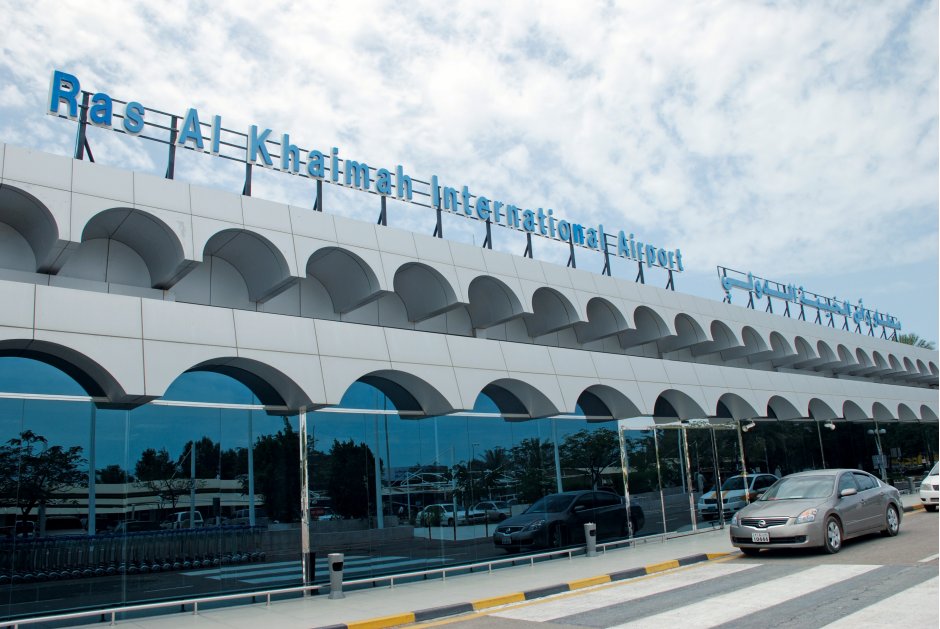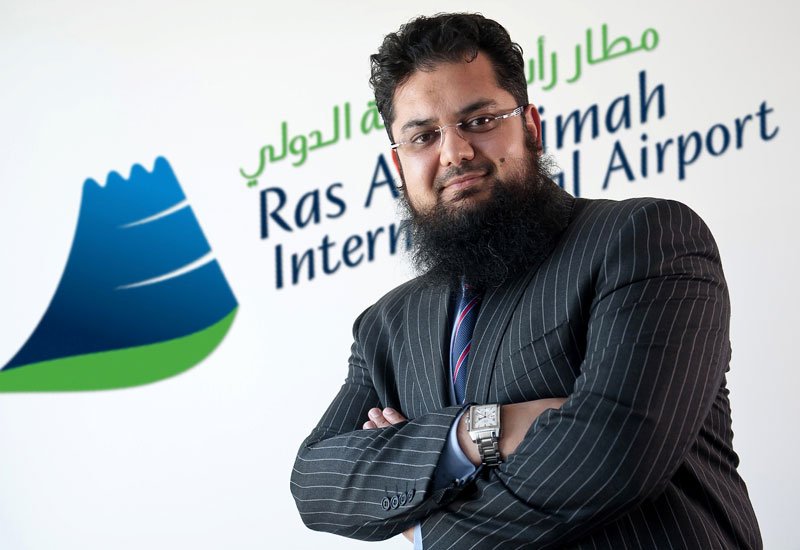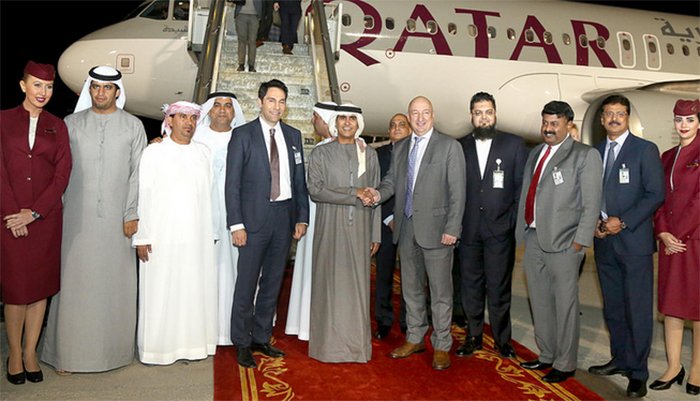With two of the fastest growing and well-connected international hubs in the country, Ras Al Khaimah International Airport clearly lives in the shadow of the mighty Dubai and Abu Dhabi homes of Emirates Airline and Etihad Airways. However, with a growing leisure appeal to visitors in the northern emirate and through new flights to another of the region’s hub airports, it is boosting its presence on the international stage.
Ras Al Khaimah may have not followed the same journey as some of its sister emirates in the UAE, but it has been on a growth trajectory. Not being a producer of oil, it has already developed a diversified economy focused on its industrial sector and is emerging as a new destination on tourism maps with new investment and developments along its coast line.
Its population has grown more than seven-fold over the past 40 years from just under a 45,000 population in 1975 to an estimated 250,000 to 300,000 currently and its airport is developing to meet this growing home market and inbound demand.
“Ras Al Khaimah is one of the fastest growing tourist destination in the region with some of the most luxurious hotels and resorts, manmade island, beautiful landscape, mountains, deserts and authentic Arabic culture,” explained Mohammed Qazi, chief executive officer and board member of Ras Al Khaimah International Airport to Routesonline in an exclusive interview ahead of the opening of World Routes in Chengdu, China.
The new mid-term plan of Ras Al Khaimah Tourism Development Authority is to make the emirate even more appealing to the modern day tourists from all across the world who are looking for new destinations all the time,” he added.
This creates a great opportunity for the airport to position itself for future growth. After opening in the mid-1970s to a limited market and low demand the facility has struggled to sustain regular air links and the failure of its former home carrier, RAK Airways, in 2008 and then again in 2013 after operations resumed, has not helped.

However, Qazi notes that with a joined-up approach with the tourism development authority, the airport is able to help build and sustain partnerships with airlines and the tourism sector to support the emirate’s development vision. “We plan to play a crucial role in the development of the destination by sharing its key features with airlines, tour/charter operators,” he said.
The airport is working closely with local stakeholders to promote direct access into Ras Al Khaimah, but also the convenience of the airport as an alternative entrance point into the country. “This is one of the areas we are currently working on with our national carrier as well as travel agents and tour operators,” explained Qazi.
“Ras Al Khaimah is less than an hour from six of the seven emirates in the UAE with excellent road connectivity. Taxis are economical in UAE to and we have a sizeable fleet operating to and from the airport. Recently we have also signed up with a number of car rental companies who are helping us enhance connectivity too,” he said.
The set-back of the collapse of RAK Airways certainly hit the airport and its strategy hard, but it has already found a new home carrier and its initial success is already helping to deliver others into the local market. Qazi acknowledged that the airport “lost a little bit of time” in its development, but in terms of strategy the airport remained focused and the results of that focus are apparent in the recent growth on both aviation and non-aviation fronts.
“RAK Airways was the national carrier and an anchor airline for the airport. As with any airport losing its anchor carrier, we RAK Airport also suffered and a lot of plans had to be put on the back burner till the airport attracted a new national carrier and the new airline had established itself,” he added.

It is the UAE low-fare carrier Air Arabia, headquartered in Sharjah, that filled that void and which is now serving eleven routes across the sub-continent, North Africa, Saudi Arabia, Qatar and Oman. “Air Arabia's arrival has been the cornerstone of our new beginning at the airport. We have a partner that is reliable, astute and active. Air Arabia is a market leader on many fronts, and working with them gives us a lot of satisfaction,” said Qazi.
But, the airport has already exceeded this success and in the best way to compete with the two major hubs in the country, it has secured an international link with Qatar Airways to Hamad International Airport in Doha, opening one-stop connection options between Ras Al Khaimah and the world.
While Qazi acknowledged that the arrival of the Qatar Airways brand this year has brought “glamour” to the emirate, it is the worldwide connectivity options that will deliver the most to Ras Al Khaimah, enabling many passengers to avoid journeys via the UAE’s busy hubs.
“If you are traveling from the northern emirates to London, New York, Germany, China, etc. you are better-off to come to Ras Al Khimah International Airport and get processed in few minutes and take a short flight to Doha than go to one of the major hubs and spend more time in queues, walking a marathon, and reaching your aircraft huffing and puffing,” he explained.
“Now we see passengers coming from as far as China and Indonesia in the east and as far as UK, Europe and the US in the West to Ras Al Khaimah due to the connection options Qatar Airways provides. We are ranked number one in the airline’s UAE network for operational performance and we hope that other full-service flag carriers would take heed from this and that they can also operate from smaller airports in the UAE and free themselves from the old fashioned myths of full-service-hub-airport romance,” he added.

Alongside Qatar Airways, Ras Al Khaimah International Airport has also secured Air India Express as a partner with flights from this summer from Calicut, which data shows are already delivering high passenger loads. The previous winter schedule had also seen charters from six cities in Germany as well as Austria, Latvia, Poland and Russia, boosting direct connectivity to 21 destinations and indirectly to more than 150 thanks to Qatar Airways.
With Ras Al Khaimah growing as an international tourist destination there are obvious development opportunities. “We believe that there should be direct connectivity to the emirate from China, India, Pakistan, East/West Europe, Russia, CIS region, Turkey, GCC and Thailand,” said Qazi. In addition, with the catchment of Ras Al Khaimah, he believes carriers from India, Philippines, Pakistan, Saudi Arabia, Kuwait, North Africa, Jordan and Oman could also consider the emirate purely for O&D traffic. “Our studies show that the above would amount to 2.5-3 million passengers per annum,” he added.
The airport puts aviation exhibitions and conferences such as the Routes world and regional air service development forums high on its agenda. It regularly attends the Asia, Europe and World events. The executive even credits attendance of the events for facilitating the arrival of Qatar Airways.
“Routes is a key strategy enabler of Ras Al Khaimah International Airport for network development, both passenger and cargo. We have been attending Routes since 2012 on a regular basis as a means to introduce our airport to the airlines. We also work closely with the likes of consultancy Airport Strategy & Marketing (ASM) to do studies for us and help us target airlines,” said Qazi.
Next year the airport also has plans to invest more in awareness campaigns while working closely with the Ras Al Khaimah Tourism Development Authority to promote the destination to airlines and tour operators. It is also developing targeted marketing campaigns to airlines or charter operators where it believes there is a strong business case for them to consider Ras Al Khaimah as a destination.
“It is difficult and cut-throat business, especially when you have two major hubs just down the road. However, we work closely with the airlines and civil aviation authorities to help achieve the goals of the emirate and deliver enhanced sustainable air links into Ras Al Khaimah,” concluded Qazi.





